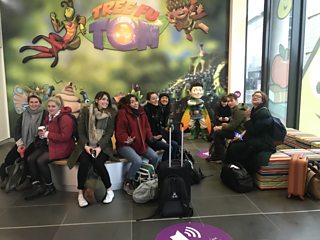The Comedy Room - Children's Day and an opportunity to pitch to Radio Drama North
Helen Parkinson
Writer
Tagged with:
Helen Parkinson is part of our Comedy Room writer development group. She gives a rundown on the group's recent two-day workshop at Media City in Salford (also including the Drama Room writers) which covered writing for Children's plus an opportunity to pitch a short Radio Drama.
Hey, I’m Helen and I’m not sure why I’m in the Comedy Room. My background is seriously serious. I was a pensive ‘Method’ actress, an earnest (read minimal budget) theatre director and producer of material that was of no laughing matter. As a writer I tackle dark topics. I thought I’d written a very serious piece of TV until everyone who read it told me it was funny. It seems the 主播大秀 thought so too. So, here I am with a bunch of stand-ups and comedy writers who are genuinely hilarious and I’m seriously hoping no one will notice that I’m not. So far, I think I’m getting away with it.
I’ve been asked to write about our third 主播大秀 Writersroom session - a two-day sojourn to the 主播大秀's base at Media City in Salford to discover all there is to know about writing for C主播大秀 and Cbeebies.
To be honest, I hadn't previously thought about writing for children. This may have something to do with the fact that I’ve raised four of them. When you’ve been through twenty years of child-rearing, you sort of don’t want to have anything to do with them for at least another two decades. Don’t get me wrong, I’ve nothing against kids' TV. Quite the reverse: Tellytubbies gave me the chance to clean my teeth, let me soak up a few minutes of respite in the shed and kept me from putting my head in the oven. But writing for kids? Animation? Puppets? Not convinced. You see, I write deeply flawed, egotistical characters in dark situations, who go on harrowing emotional journeys and find redemption, only to have it taken away. Not the stuff of pre-school TV. But, as we sat on brightly coloured stools under the Tree Fu Tom backdrop in C主播大秀’s reception, I determined to keep an open mind. This is important at my age. Although, maybe I should close it – I’ve noticed things keep disappearing.

The writers waiting watched over by Tree Fu Tom
But before ‘Children’s Day,’ we had an afternoon workshop with Radio Drama North. Instantly, I felt at home (in front of the ironing board actually – radio drama has accompanied me though many a pile of school shirts). Now we were to be given not only top tips, but the opportunity for a commission to write a short audio drama script for 主播大秀 Radio 3’s programme The Verb. The remit was to explore language-use, to realise something interesting about the way we talk to each other, with an emphasis on experimentation. Producer Sharon Sephton stressed the need for making the audience care about the characters and what happens to them. ‘Openings’ were important: we should aim for instant jeopardy and intrigue to hook the listener in. She suggested we ask ourselves a series of questions before beginning to write: whose story is this and what do you want to say with it? How do the characters change? Is there a resolution? A twist? What makes it unique and fresh? And what makes it good for radio? This last question was possibly the most thought provoking. Especially, as Sharon pointed out, radio drama can take us anywhere, any time and into any body, even a non-human one – no need for expensive prosthetics, just a few choice words would do the trick. I was seriously inspired: we had the blank canvas of the listener’s mind to play with. No holds barred. The universe was our oyster (or even an oyster). Unlimited no strings… Then I heard Sharon say: ‘Oh, and it all needs to be done in five minutes. So, have a think over the tea break, then give us your pitches.’
Watch Scriptwriting advice from Radio Drama North
Now after three months spent in the Comedy Room there are two things I’ve learned about writers. Firstly, they like their food, preferably sweet and starchy and served at frequent intervals and, secondly, they don’t like pitches. We had pitched ideas in a previous session, but that had been to the group and Comedy Room Executive Simon Nelson and Assistant Producer Amanda Farley, who didn’t really count, because we’d been out drinking with them at the 主播大秀 Club (a definite perk) and realised they were just ordinary, fun people. But now we were going to have to pitch to SIGNIFICANT SERIOUS 主播大秀 PEOPLE. It’s fair to say, even the mince pies and gluten free bars didn’t alleviate the onset of the ‘pitch sweats.’ As it turned out, the pitching wasn’t at all harrowing. We disseminated into groups, each with a producer/script editor and discussed ideas, some half formed, some fully fledged, all unique and full of potential. Then we were given individual feedback followed by another mince pie. All in all, pretty painless. Sighs of relief all round. But not for long…
Watch Advice on writing for Radio from the team at 主播大秀 Radio Drama North
There’s another thing I’ve discovered about writers. They hate networking. Like really hate it: a frontal lobotomy is more appealing than talking to an ‘industry professional.’ So, when the catering trolley rolled in, heralding the start of the ‘Industry Drinks – Meet the Producers’ event, the writers huddled together around the table, swilling and grazing and pretending not to notice the VIPs arriving. Simon had tasked us with getting email addresses and he and Amanda, cattle prods in hand, herded us out into the room. Maybe it was the alcohol, or the fact that the VIPs were really nice, keen to talk and happy to hand out email addresses, that made it an (almost) enjoyable experience. Needless to say, there was a lot of email bartering in the bar afterwards.
The following ‘Children’s Day’ consisted of a packed schedule. In preparation, we all tucked into a substantial breakfast at the hotel.
First off was the Scripted Development team. Executive Producer, gave us the run down on how they develop content with writers. Very briefly, if they like your idea, a writer is commissioned (paid!) to produce the ‘Outline.’ Get past this stage and then they help you develop it into a ‘Scene by Scene’ and if it is sufficiently gripping and unputdownable, you get commissioned to write the script. This is sent to the commissioner who will make the final decision. Of course, in the Q&A, everyone wanted to know what the secret ingredient was, the top tip, the magical pathway to the holy grail of the commissioner’s endorsement. The answer, it seemed, was simple: character. Yes, they want exciting new concepts, fresh perspectives, and compelling stories that can appeal internationally, but, ultimately, it comes down to character. Be they covered in fur, unable to utter a word, (or a sponge), children want characters to care about. And producers want children to spend time with these characters for series after series, after series.
Next up was , Senior Content Producer for Children’s Interactive TV. Now, the only part of interactive TV I have any experience of is the red button on my remote. So, it was an eye-opener to discover that there is a whole world of digital opportunities for writers, including Web dramas and storytelling on social media platforms such as Instagram, offering children a chance to follow characters outside of the world of the series (in my day the closest we came to this was the TV annual); offering writers the opportunity to develop much-loved characters further.

Danger Mouse on C主播大秀
Coffee and biscuits and an episode of Danger Mouse took us into the realm of children’s animation. Animation lets children go to places that live action can’t. Things can happen to characters that don’t happen in the real world, without scary real-world consequences. This makes it fertile ground for the comedy writer (that’s me out then) as the action can be extreme. But, don’t be duped, the Animation Development team emphasised, it’s not the animation that makes for a successful TV series, it’s the characters. The animators, like actors, get inspiration from characters. The script is their blueprint. So, work hard to give characters flaws, inner lives and outer conflicts, moral conflicts. This is what makes kids come back for more.
After sandwiches and cake, , Executive Producer of the 4 o’clock Club, emphasised the need to roll up our sleeves, and get down and dirty with the development process. Don’t hate it, embrace it. This, he said, was the secret to creating a long running series (plus lots of dosh, acclaim and further opportunities). Needless to say, everyone had their pens ready when he announced the three golden rules to help us achieve this:
Rule 1: You can’t polish a turd. In order to avoid this, spend a lot of time in development. Embrace the process. Explore the ‘What if…’ as far as it will go. And further.
Rule 2: You have to kiss a lot of frogs. Check out a shed load of ideas. Be brave. Don’t worry about making mistakes. Be robust! Test and retest the idea until you find one that is indestructible. Dump it if it isn’t working.
Rule 3: The devil is in the detail. Make sure you have nailed down every detail before beginning to write a line of dialogue. Be a technician, a craftsperson. Aim at all times for excellence in this process. Produce watertight story maps across A, B and C strands and DO NOT integrate them until the final draft. And importantly, produce fully fleshed out characters with flaws and skills that will help them deal with what is thrown at them and ultimately provoke emotional change.

4 O'Clock Club on C主播大秀
By now I was beginning to realise that there was a recurring theme throughout all these sessions. No matter what the medium, radio, animation, puppetry, no matter what age group, from pre-school to teen, it was all about the characters. Now, I know this. I do. And I love writing characters. In fact, most people say it is my strength. But, for some reason, when it came to the task we had been set a couple days earlier, that of pitching an idea for a scripted show for a C主播大秀 slot, I hadn’t given the characters much thought.
I had been desperate to make the ‘idea’ exciting/appealing to a teen audience, spending hours plotting a meets scenario. I’d researched the ‘world’ I knew what was going to happen to my ‘bunch of kids,’ but now I realised I hadn’t fully developed any of the characters. Of course, I’m pretty sure I’d have tackled this at some point, but now, as I sat with Senior Development Producer Hannah Rodger and four other writers, I knew that this pitch wasn’t going to catch fire. It lacked what kids want most: great characters they want to spend time with. For me, this was a lesson well learned.
What I also learned is how attuned Development people are on picking up on an idea, instantly spotting what is interesting and different. Or not. We had five minutes to pitch and believe me this is enough. The pitches that made the most impact were the ones that gave the broad brushstrokes of setting and story, touched on themes, followed by a succinct description of a couple of main characters: needs, wants, obstacles, emotional journey, and then popped in the odd fine detail to spark an image/idea that was irresistible. Too much detail and like white noise, it started to lose impact, too little and it wasn’t engaging. I don’t think any of us got it ‘just right’ but, hey, for most of us, this was a first time and one which was an invaluable learning experience.

Tree Fu Tom on CBeebies
Fortunately, tea and scones followed (I do feel I ate my way through the 主播大秀) and then the opportunity to hear from three real (i.e. paid) writers , and . This was the perfect antidote to the pitch sweats. Hearing their stories was encouraging, if only because it seemed most of them got where they were by a series of events that did not include giving the best pitch ever.
Just as we were flagging (or perhaps sinking into a food coma) the last act appeared, Vanessa Amberleigh, Executive Producer at CBeebies, roused us with a brilliantly, speedy delivery of what pre-schoolers like. Here are a few I jotted down: ‘Hellos’ and ‘Goodbyes’ are popular. Slapstick too, but only of the ‘best behaviour’ variety. Pre-schoolers have enormous egos (does this change?), so use emotional journeys that teach empathy (good luck: my Y.A.s still struggle with this). Pre-school is the ‘gang phase’ – what one says the others follow – so try to give them confidence in their own opinions. They like format, the anticipation is half the fun (I can relate to that). And they like humour, as well as songs and puppets. Remember these characters can shape a child’s outlook on life (I wonder if Worzel Gummidge removing his head and replacing it with another has impacted on my world view…). More importantly, they will imitate behaviour, so ask yourself, would you be happy to see a child doing what your characters are doing?
This last question resonated as I popped open my salad box on the train home. I’d thought I’d struggle to write for kids TV. But now I realised Danger Mouse wasn’t so very different from the vain, egotistical, hubristic people who appear in my scripts. (Let’s face it, even Peppa Pig can be a bit of a cow). The harrowing journeys I put my characters on, aren’t so very different – Danger Mouse regularly has the daunting task of saving the world – and the redemption/resolutions are short lived: he will always forget how much he needs Penfold and Baron Silas von Greenback will always have a plan…
So, as I sat back munching through my spinach, it occurred to me that, after all, there may be a space in all this fun for a seriously serious writer like me.
Find out more about the Comedy Room and Drama Room
